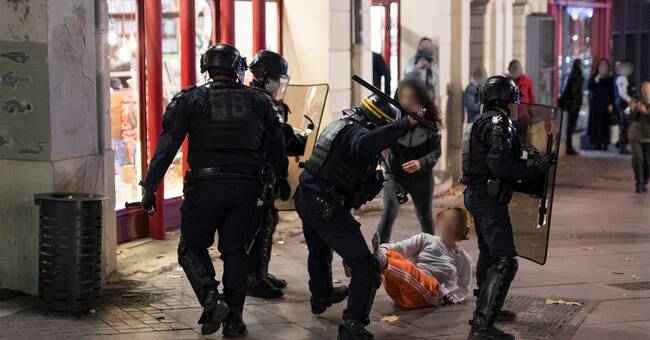At the end of November, the French National Assembly - of which the president's party La République en Marche is the largest party - adopted a high-profile bill on "Global Security".
The law includes the controversial Article 24, which seeks to prohibit the "malicious use of images showing police officers in the course of their duties", and to prevent the dissemination of images that violate "the physical or mental integrity of police officers".
The bill was debated on the same day as the police raided a newly established tent camp for asylum seekers in central Paris.
Pictures taken by the public from the police evacuation shocked many due to the brutal nature of the intervention: blows with batons against asylum seekers, use of tear gas and shock grenades.
A violence that also affected a journalist present who was injured in connection with the police operation.
Common to these events and that of the music producer is that they would not have become known to the public without pictures of the interventions taken by the public or by journalists.
The new security law would make such images impossible and punish those who publish the images (eg journalists), say the critics who joined in large crowds during yesterday's demonstrations.
A historical heritage
The fact that the reactions are so strong has to do with the fact that the right and the will to manifest their opinions is a strong historical legacy among many French people.
The so-called Yellow West's protests against some of the economic reforms introduced by Marcron's government after taking power in 2017 are examples of this.
The demonstrations have been marred by clashes between police and protesters, sometimes with accusations of unjustified police brutality.
The slogans of the French Republic, Freedom, Equality and Brotherhood minted are associated with the French Revolution of 1789. Now some fear that the first slogan, Freedom, is being abandoned.
Recently, a notable appeal was published by thirty French intellectuals under the headline "This is not what we voted for, Mr President."
Behind the call were cultural figures such as Ariane Mnouchkine (theater director), Constantin Costa-Gavras (filmmaker) as well as lawyers or social scientists such as Olivier Roy.
Common to the people behind the call is that they all voted for the liberal Macron in the second round of the presidential election when the opponent was the nationalist right-wing Marine le Pen.
Freedom slogan threatened
They believe that the government is going through the affairs of its main opponent and turning the rule of law France into a police state.
It points partly to the new law on Global Security, but also to the so-called law against Separatism, which will soon be presented and which has received attention in connection with the recent terrorist attacks.
That law says it wants to stop Islamist tendencies in French society.
Messages on the internet that "violate the ideas of the republic" should be banned, is one of the proposals.
- The government urges us to continue making caricatures in the name of freedom of expression, but at the same time they want to remove the right to criticize caricatures?
Such laws go against the freedom of expression that we have always guarded, says social scientist Olivier Roy, one of the people behind the call against the government's policy.
Although the Global Security Act was recently passed by the National Assembly, the massive protests, which also occur in Macron's own party, suggest that the controversial Article 24 banning "malicious" publications of police photos will be changed when the law is eventually passed in the Senate.
The bill against Separatism will be presented in a few days.

